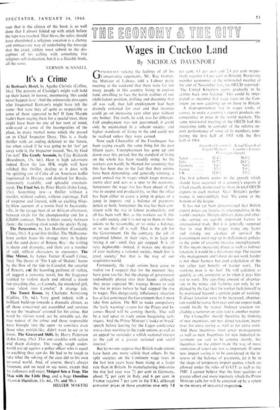It's a Crime
At Bertram's lintel, by Agatha Christie (Collins, 16s.). The patrons of Claridge's might well hold up their hands in horror, murmuring 'this could never happen here.' And the aristocratic dowagers who frequented Bertram's might have felt the same—but were they all quite as respectable as some of them appeared to be? If Jane Mamie hadn't been staying there for a special treat, there might have been no one of her turn of mind, wide-eyed at some of the incongruities of the place, to make mental notes which she passed on to Chief Inspector Davy. This is a lively thriller with an ending deferred to the future, for when asked if he was going to let 'her' get away with it, the Inspector roared, 'No, by God I'm not!' The Gentle Assassin, by Clay Richards (Boardman, 13s. 6d.). Here is high adventure indeed. Even the late JFK might well have relished this thriller, dealing as it does with the spiriting out of Cuba of an American boffin imprisoned in Havana and destined for Russia. Immensely readable, and splendid entertain- ment. The Final Set, by Peter Harris (John Long, 15s.). Something new—a thriller without a murder, without sadism, without espionage. Full of suspense and interest, with an exciting blow- by-blow account of a tennis final in Jacaranda- ville, in the savage heat of an African afternoon, between rivals for the championship and for a £20,000 contract. There is bitter enmity between them : the resulting clash sends the sparks flying.
The Persecutor, by Ian Hamilton (Constable Crime, 18s.). A good first thriller. The Melbourne- born author bases his strange story in Sydney and the sand dunes of Botany Bay : the writing is sharp and dramatic, and there are a number of odd, offbeat characters to encounter. The Blue Mirror, by James Turner (Cassell Crime, 16s.). The theme of 'The Lady of Shalott,' borne by the flow of the tide to Camelot, the coverlet of flowers, antl the haunting perfume of violets, all suggest a romantic novel, but the fragrance testified to violent death and offered a dumb but revealing clue, as Carmela, the murdered girl, came 'silent into Camelot.' A strange tale.
The Turret Room, by Charlotte Armstrong (Collins, 13s. 6d.). Very good indeed, with a brilliant build-up towards a dramatic climax, as all those concerned are assembled and anxious to see the 'madman' arrested for his crime. But word by vicious word, act by unstable act, the true nature of the crime and those responsible were brought into the open—to convince even those who, ostrich-like, didn't want to see or to know. The Graveyard Shift, by Harry Patterson (John Lone. 15s.). This one crackles with action and sharp dialogue. The rough, tough under- world are up against a police officer who is equal to anything they can do. He had to be tough to take what the solving of the case did to his own personal world. And, of course, there's always Simenon, and no need to say more, except that his followers will enjoy Maigret Sets a Trap, The Man with the Little Dog, and a huge Omnibus (1 I itmish Hamilton, 13s. 6d., 15s. and 30s.).
HESTER MAKEIG


































 Previous page
Previous page